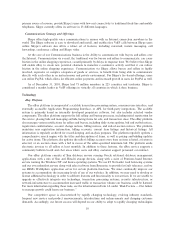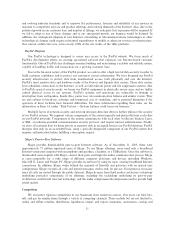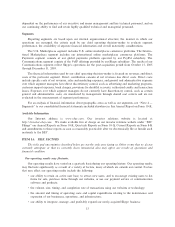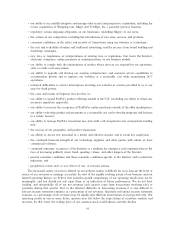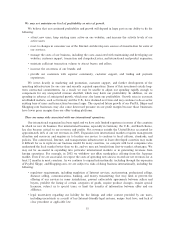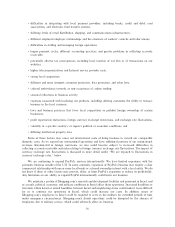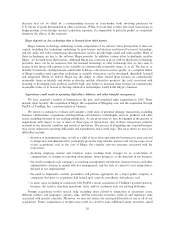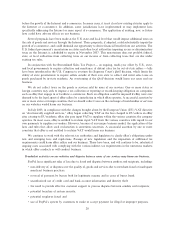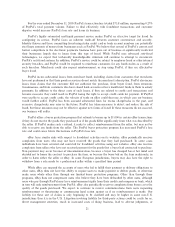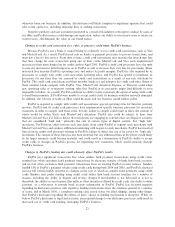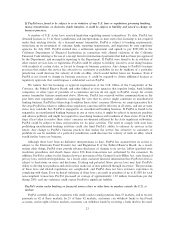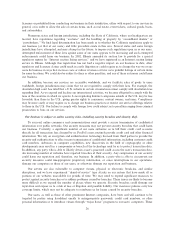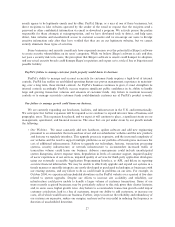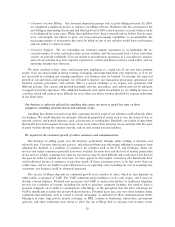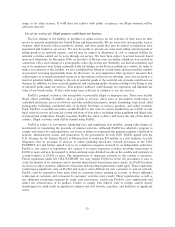eBay 2005 Annual Report Download - page 24
Download and view the complete annual report
Please find page 24 of the 2005 eBay annual report below. You can navigate through the pages in the report by either clicking on the pages listed below, or by using the keyword search tool below to find specific information within the annual report.before the growth of the Internet and e-commerce. In many cases, it is not clear how existing statutes apply to
the Internet or e-commerce. In addition, some jurisdictions have implemented or may implement laws
specifically addressing the Internet or some aspect of e-commerce. The application of existing, new, or future
laws could have adverse effects on our business.
Several proposals have been made at the U.S. state and local level that would impose additional taxes on
the sale of goods and services through the Internet. These proposals, if adopted, could substantially impair the
growth of e-commerce, and could diminish our opportunity to derive financial benefit from our activities. The
U.S. federal government's moratorium on states and other local authorities imposing access or discriminatory
taxes on the Internet is scheduled to expire in November 2007. This moratorium does not prohibit federal,
state, or local authorities from collecting taxes on our income or from collecting taxes that are due under
existing tax rules.
In conjunction with the Streamlined Sales Tax Project Ì an ongoing, multi-year effort by U.S., state,
and local governments to require collection and remittance of distant sales tax by out-of-state sellers Ì bills
have been introduced in the U.S. Congress to overturn the Supreme Court's Quill decision, which limits the
ability of state governments to require sellers outside of their own state to collect and remit sales taxes on
goods purchased by in-state residents. An overturning of the Quill decision would harm our users and our
business.
We do not collect taxes on the goods or services sold by users of our services. One or more states or
foreign countries may seek to impose a tax collection or reporting or record-keeping obligation on companies
such as eBay that engage in or facilitate e-commerce. Such an obligation could be imposed if eBay were ever
deemed to be the legal agent of eBay sellers by a jurisdiction in which eBay operates. A successful assertion by
one or more states or foreign countries that we should collect taxes on the exchange of merchandise or services
on our websites would harm our business.
In July 2003, in compliance with the changes brought about by the European Union (EU) VAT directive
on ""electronically supplied services,'' eBay began collecting VAT on the fees charged to EU sellers on eBay
sites catering to EU residents. eBay also pays input VAT to suppliers within the various countries the company
operates. In most cases, eBay is entitled to reclaim input VAT from the various countries with regard to our
own payments to suppliers or vendors. However, because of our unique business model, the application of the
laws and rules that allow such reclamation is sometimes uncertain. A successful assertion by one or more
countries that eBay is not entitled to reclaim VAT would harm our business.
We continue to work with the relevant tax authorities and legislators to clarify eBay's obligations under
new and emerging laws and regulations. Passage of new legislation and the imposition of additional tax
requirements could harm eBay sellers and our business. There have been, and will continue to be, substantial
ongoing costs associated with complying with the various indirect tax requirements in the numerous markets
in which eBay conducts or will conduct business.
Fraudulent activities on our websites and disputes between users of our services may harm our business.
PayPal faces significant risks of loss due to fraud and disputes between senders and recipients, including:
‚ non-delivery of, or disputes over the quality of, goods and services due to merchant fraud or inadequate
merchant business practices;
‚ reversal of payment by buyers both for legitimate reasons and in cases of buyer fraud;
‚ unauthorized use of credit card and bank account information and identity theft;
‚ the need to provide effective customer support to process disputes between senders and recipients;
‚ potential breaches of system security;
‚ potential employee fraud; and
‚ use of PayPal's system by customers to make or accept payment for illegal or improper purposes.
20


